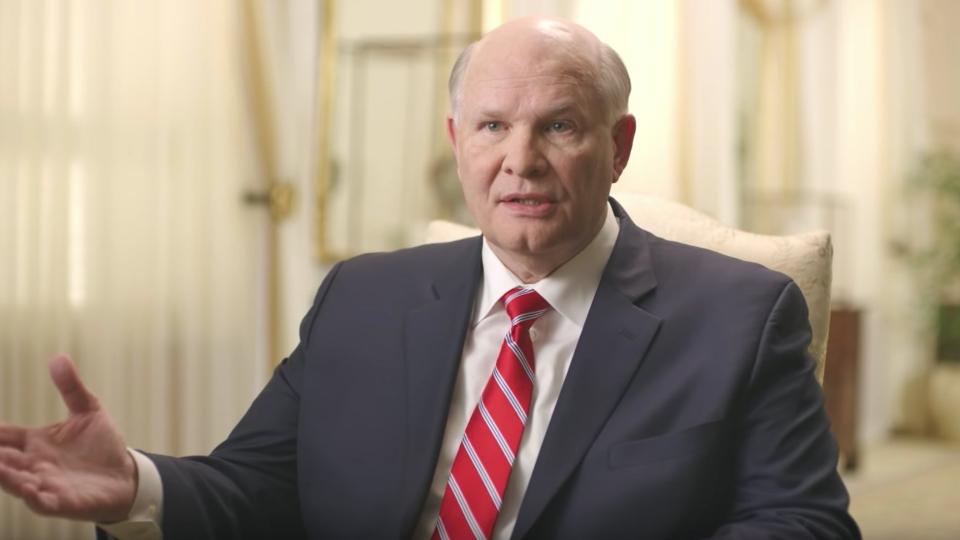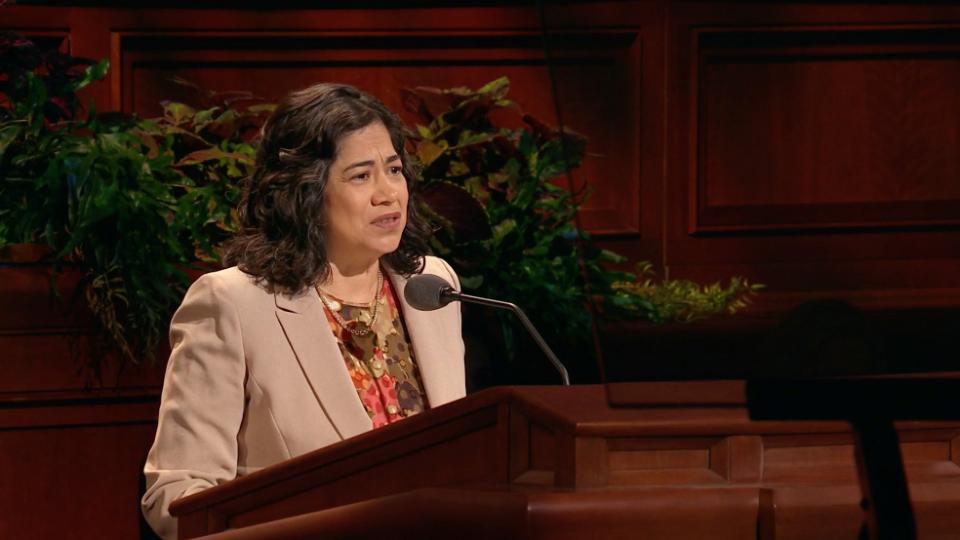
Mental-Health
Elder Dale G. Renlund of the Quorum of the Twelve Apostles talks about suicide prevention in a series of videos produced by the Church. Screenshot courtesy of Church News.All rights reserved.This story appears here courtesy of TheChurchNews.com. It is not for use by other media.
By Megan McKellar, Church News
Leaders of The Church of Jesus Christ of Latter-day Saints have often taught about the importance of mental health. Here’s a look at some of the things they’ve said about the reality of mental illness and how to work through various mental health struggles.
The Reality of Mental Health Challenges
Sister Reyna Isabel Aburto, second counselor in the Relief Society general presidency, taught during her October 2019 general conference address: “It is normal to feel sad or worried once in a while. Sadness and anxiety are natural human emotions. However, if we are constantly sad and if our pain blocks our ability to feel the love of our Heavenly Father and His Son and the influence of the Holy Ghost, then we may be suffering from depression, anxiety or another emotional condition.”
The cause of depression or anxiety can sometimes be identified, but not always, she explained. “Our brains may suffer because of stress or staggering fatigue, which can sometimes be improved through adjustments in diet, sleep and exercise,” she said. “Other times, therapy or medication under the direction of trained professionals may also be needed.”
When left untreated, mental or emotional illness can lead to increased isolation, misunderstandings, broken relationships, self-harm and even suicide, Sister Aburto said. “I know this firsthand, as my own father died by suicide many years ago. His death was shocking and heartbreaking for my family and me. It has taken me years to work through my grief, and it was only recently that I learned talking about suicide in appropriate ways actually helps to prevent it rather than encourage it.”
In a 2018 devotional with young married couples in the Los Angeles area, President Dallin H. Oaks, first counselor in the First Presidency, acknowledged the prevalence of mental health struggles.
“Scholars reported in 2014 that 1 in 5 of the U.S. population between the ages of 18 to 25 had a mental illness,” President Oaks said.
In addition, between 2008 and 2016, there was a 40 percent increase in college students being diagnosed or treated for depression, and a 70 percent increase in diagnosis of or treatment for anxiety, President Oaks said. “Truly these are different times for your generation.”

Mental-Health
President Dallin H. Oaks, first counselor in the First Presidency, greets members of a capacity congregation of young married couples from nine stakes in the Los Angeles area before a devotional, held in the Los Angeles California Santa Monica Stake Center on Friday, Aug. 24, 2018. Courtesy of Church News.All rights reserved.Seeking Medical Help
Sister Aburto explained that “like any part of the body, the brain is subject to illnesses, trauma and chemical imbalances. When our minds are suffering, it is appropriate to seek help from God, from those around us, and from medical and mental health professionals.”
During the 2021 BYU Women’s Conference, Sister Michelle D. Craig, first counselor in the Young Women general presidency, said: “One thing that I have learned is that a side effect of clinical depression is feeling numb and not feeling the Spirit. It’s so important that people realize this is not an indication of their worthiness or their worth when they feel that, or they feel nothing.”
She encouraged the use of available mental health resources, such as physicians and medication. “Take care of your physical health and your spiritual health,” Sister Craig said. “Sometimes we just need to hold on with our head what we don’t feel in the moment in our own heart.”
In his October 2013 general conference address, Elder Jeffrey R. Holland of the Quorum of the Twelve Apostles advised those who are faced with mental health challenges to “seek the advice of reputable people with certified training, professional skills and good values. … If you had appendicitis, God would expect you to seek a priesthood blessing and get the best medical care available. So too with emotional disorders. Our Father in Heaven expects us to use all of the marvelous gifts He has provided in this glorious dispensation.”
The late Elder Alexander B. Morrison, an emeritus General Authority Seventy, gave instruction during a 2006 meeting in Salt Lake City for the Utah Chapter of the National Alliance on Mental Illness. “Despite the fact that medications are far from perfect and may cause serious unwanted and deleterious side effects, numerous medications are effective against one or more forms of mental illness,” he said. “Furthermore, skilled psychologists have available a number of therapeutic regimens which do not require administration of drugs, and which are of great — even curative — value to sufferers from mental illness.”

Mental-Health
Sister Michelle D. Craig, first counselor in the Young Women general presidency, answers a question during the BYU Women’s Conference Sister to Sister event on April 30, 2021. Photo by Nate Edwards, courtesy of Church News.All rights reserved.Show Compassion for Those With Mental Illness
“Some of the heaviest burdens borne by sufferers from mental illness and their families are the prejudice, ignorance and misunderstanding which characterize the attitudes of many in society towards the mentally ill. Many victims, and their families, feel, for good reason, that they will be ridiculed, whispered about, even shunned, if they admit to mental illness and seek help for their disorders,” Elder Morrison said.
In the video “Understanding Suicide,” Elder Dale G. Renlund of the Quorum of the Twelve Apostles taught: “We know from all the statistics out there that someone in the ward is hurting, someone is having suicidal thoughts in your ward, and as we come together as families, as churches, and a community, we can do better than we’re doing now. … This is the way that we decrease any kind of embarrassment, reduce any kind of stigma and gain further understanding about the process.”
He stressed the importance of the Church “as a community, coming together and helping each other through this life.”
“What we need to do as a Church is to reach out in love and caring for those who have suicidal thoughts, who have attempted suicide, who feel marginalized in any way. We need to reach out with love and understanding, and you do that in concert with health care professionals, and with ecclesiastical leaders, with friends and family’s support.”
Disciples of Jesus Christ have made a covenant with God to be “willing to bear one another’s burdens” and “to mourn with those that mourn” (Mosiah 18:8-9).
“This may include becoming informed about emotional illnesses, finding resources that can help address these struggles, and ultimately bringing ourselves and others to Christ, who is the Master Healer,” Sister Aburto taught. “Even if we do not know how to relate to what others are going through, validating that their pain is real can be an important first step in finding understanding and healing.”
She went on to suggest how to help those who suffer from severe depression and as a result, “distance themselves from their fellow Saints because they feel they do not fit some imaginary mold.”
“We can help them know and feel that they do indeed belong with us. It is important to recognize that depression is not the result of weakness, nor is it usually the result of sin,” Sister Aburto said. “It ‘thrives in secrecy but shrinks in empathy.’ Together, we can break through the clouds of isolation and stigma so the burden of shame is lifted, and miracles of healing can occur.”
While God is at work healing and repairing broken minds, “the rest of us can help by being merciful, nonjudgmental and kind,” Elder Holland said.
Sister Aburto extended an invitation to “follow the Savior’s path and increase our compassion, diminish our tendency to judge, and stop being the inspectors of the spirituality of others.” Listening with love, she said, is “one of the greatest gifts we can offer, and we may be able to help carry or lift the heavy clouds that suffocate our loved ones and friends so that, through our love, they can once again feel the Holy Ghost and perceive the light that emanates from Jesus Christ.”

Mental-Health
Sister Reyna Isabel Aburto, second counselor in the Relief Society general presidency, speaks during the general women’s session in the 189th Semiannual General Conference of the Church on October 5, 2019. Photo Courtesy of Church NewsAll rights reserved.Avoid Shame
In the 2021 BYU Women’s Conference Sister to Sister event, thousands of questions were submitted about stress, anxiety and mental health.
“A lot of people asked about guilt versus shame, which I think is something really important,” said Sister Sharon Eubank, first counselor in the Relief Society general presidency. “Guilt is [when] your conscience tells you that that behavior probably wasn’t in line with your values; shame is that feeling of ‘I am a failure, there’s something broken in me, I am a disaster and can never be fixed.’ In my personal opinion, shame doesn’t really help anything.”
Elder Holland emphasized the fact that mental illnesses and emotional disorders “are some of the realities of mortal life, and there should be no more shame in acknowledging them than in acknowledging a battle with high blood pressure or the sudden appearance of a malignant tumor.”
“We are infinitely more than our limitations or our afflictions!” he declared.
Opening up about emotional challenges is crucial, because by doing so, “we give others permission to share their struggles,” Sister Aburto said. “Together we realize there is hope and we do not have to suffer alone.”
In addition, because of a “thorn in the flesh,” “you may have the ability to feel more compassion toward others,” Sister Aburto explained. “As guided by the Holy Ghost, share your story in order to ‘succor the weak, lift up the hands which hang down, and strengthen the feeble knees.’”
During a devotional given to BYU–Hawaii students in June 2019, President Oaks offered insight into a possible factor for anxiety — the increased opportunity to compare one’s life to others using technology and social media.
“Such [person-to-person] comparisons are contrary to the scripture teaching that we are not required to run faster than we have strength,” President Oaks said. “Our loving Savior will judge us individually, not according to the performance of our peers.”

Mental-Health
Elder Jeffrey R. Holland and his wife, Sister Patricia Holland, wave as they leave the stand following the Sunday afternoon session of the 183rd Semiannual General Conference of The Church of Jesus Christ of Latter-day Saints, October 6, 2013, inside the Conference Center. Photo by Scott G Winterton, courtesy of Church News.All rights reserved.The Role of the Savior
No matter the uncertainties about the causes of anxiety, the gospel gives hope and assurance, as well as perspective to understand the purpose of life and the role of opposition, President Oaks taught.
In an October 2016 general conference address, Sister Carole M. Stephens, then first counselor in the Relief Society general presidency, testified of the Savior’s ability to comfort, sustain and heal in the midst of the “realities of mortality, such as disaster, mental illness, disease, chronic pain and death.”
She shared the story of a young woman with bipolar disorder, who described one of her darkest days to Sister Stephens:
“I can remember sobbing, tears racing down my face as I gasped for air. But even such intense suffering paled in comparison to the pain that followed as I observed panic overwhelm my mother, so desperate to help me. … But little did we know that despite the deepening darkness, we were just moments away from experiencing a mighty miracle. … When I was convinced I could take no more, just then something marvelous occurred. A transcendent and wonderful power suddenly overtook my body. Then, with a ‘strength beyond my own,’ I declared to my mom with great conviction seven life-changing words in response to her repeated desire to bear my pain. I said, ‘You don’t have to; Someone already has.’"

Mental-Health
Sister Carole M. Stephens speaking at the pulpit during the Saturday morning session of General Conference, October 2013.2021 by Intellectual Reserve, Inc. All rights reserved.Although this young woman was not healed completely that day, she received light in a time of darkness. “And today, supported by a bedrock understanding of the doctrine of Christ and refreshed daily by the Savior’s living water, she continues on her journey toward healing and exercises unshakable faith in the Master Healer,” Sister Stephens said.
Elder Holland taught that in the midst of mental and emotional suffering, “of greatest assurance in God’s plan is that a Savior was promised, a Redeemer, who through our faith in Him would lift us triumphantly over those tests and trials, even though the cost to do so would be unfathomable for both the Father who sent Him and the Son who came. It is only an appreciation of this divine love that will make our own lesser suffering first bearable, then understandable, and finally redemptive.”
Above all, Elder Holland said, never lose faith in your Father in Heaven, who loves you more than you can comprehend.
“As President Monson said … ‘That love never changes. … It is there for you when you are sad or happy, discouraged or hopeful. God’s love is there for you whether or not you feel you deserve [it]. It is simply always there.’”
“Never, ever doubt that, and never harden your heart,” Elder Holland said. “Faithfully pursue the time-tested devotional practices that bring the Spirit of the Lord into your life. Seek the counsel of those who hold keys for your spiritual well-being. Ask for and cherish priesthood blessings. Take the sacrament every week, and hold fast to the perfecting promises of the Atonement of Jesus Christ.
“Believe in miracles. I have seen so many of them come when every other indication would say that hope was lost. Hope is never lost. If those miracles do not come soon or fully or seemingly at all, remember the Savior’s own anguished example: If the bitter cup does not pass, drink it and be strong, trusting in happier days ahead.”
Copyright 2021 Deseret News Publishing Company